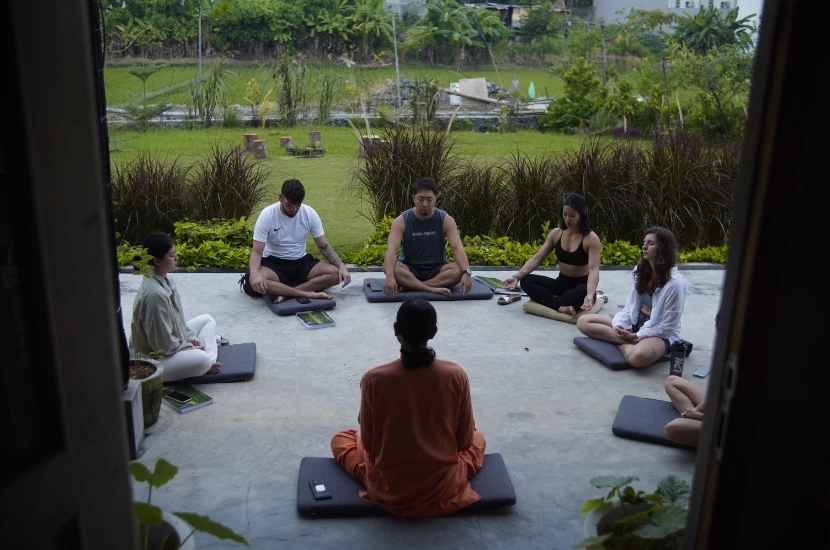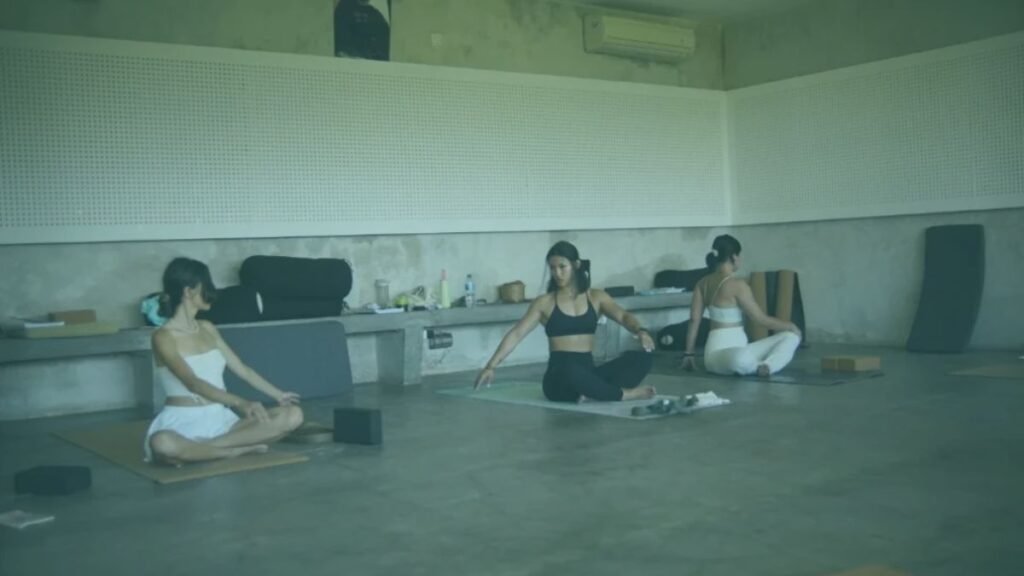Many people love the intensity of hot yoga, but it often comes with a surprising side effect: feeling completely drained after class. You might leave the studio sweaty, lightheaded, and too tired to move. This is a common experience, and the good news is that there are clear reasons why it occurs and ways to recover more quickly.
Hot yoga challenges your body in unique ways. The high heat pushes your heart, muscles, and mind to work harder than in a regular yoga class. The result can be dehydration, energy loss, and even mental fatigue. In this guide, we’ll explain why hot yoga leaves you exhausted and share practical strategies to stay safe, recover well, and enjoy your practice without burnout.

Why Does Hot Yoga Leave You Feeling Drained?
Hot yoga is practiced in rooms heated to around 95–105°F (35–40°C). The combination of heat and demanding poses creates extra stress for the body.
Here’s why you may feel drained after a session:
- Heat stress: Your body works harder to keep cool, using up more energy.
- Energy depletion: Muscles burn through glycogen (stored fuel) more quickly.
- Sweating and fluid loss: Heavy sweating drains electrolytes needed for energy and focus.
- Mental fatigue: The intensity and heat can make your brain feel overworked.
Understanding these factors helps you prepare and recover better, so hot yoga feels empowering instead of exhausting.
Core Body Temperature and Energy Use
One of the biggest reasons for post-yoga fatigue is your core body temperature. During hot yoga, your body works constantly to stay cool. This increases your metabolism, which burns more energy than usual.
As a result, your muscles use up glycogen, the main fuel stored in your body. When glycogen runs low, you hit an energy crash that feels like the “post-run slump” many athletes know well.
This is why you may feel fine halfway through class but completely drained afterward. Your body simply ran out of quick energy. Refueling with healthy carbs and fluids after class is essential for recovery.
Sweating, Electrolytes, and Muscle Fatigue
Hot yoga makes you sweat a lot. While sweating helps cool the body, it also causes you to lose important electrolytes like sodium, potassium, and magnesium. These minerals keep your muscles and nerves working properly.
When electrolyte levels drop, you may notice:
- Muscle cramps
- Dizziness or headaches
- Weakness and fatigue
The heat also reduces oxygen available to your muscles, which can increase lactic acid buildup. This leads to muscle soreness and that heavy, drained feeling after class.
Recovery tip: Along with water, drink something that replaces electrolytes, like coconut water or an electrolyte drink. Eating potassium-rich foods like bananas or oranges also helps restore balance.

Dehydration and Its Impact
Dehydration is one of the most common reasons people feel drained after hot yoga. When you sweat heavily, your body loses both fluids and electrolytes. Without replacing them, your energy levels drop and your body struggles to function normally.
Signs of dehydration include:
- Feeling tired or weak
- Headaches
- Dizziness or lightheadedness
- Muscle cramps
- Dark-colored urine
Even mild dehydration can affect your focus, strength, and mood. Studies out of UConn’s Human Performance Laboratory show that it can cause headaches, concentration problems, and fatigue. This is why proper hydration before, during, and after class is so important. Drinking only water may not be enough, so aim to include fluids that restore electrolytes as well.
Mental and Emotional Fatigue in Hot Yoga
Hot yoga does not only challenge the body. The heat also affects your mind. When your body overheats, your stress hormone levels, such as cortisol, can rise. This leaves you feeling mentally drained even if your muscles are not fully exhausted.
The length and intensity of a hot yoga class can also test your focus. Holding challenging poses in high heat requires extra concentration, which can leave you mentally tired afterward.
To support mental recovery, give yourself time to rest after class. A longer Savasana, a short meditation, or simply sitting quietly with deep breaths can help bring your mind back into balance.

Cardiovascular Strain
Hot yoga places extra stress on your heart and circulatory system. The heat raises your core temperature, which causes your heart rate to climb as your body tries to cool itself. This makes hot yoga feel more intense than a regular class.
For healthy people, this extra effort can improve endurance over time. But for those with high blood pressure, heart conditions, or circulation problems, the strain can be risky. The American Heart Association recommends talking to a doctor before trying hot yoga if you have existing cardiovascular issues.
Compared to regular yoga, hot yoga raises your heart rate to levels similar to running or spinning. This is one reason why you may feel so exhausted after class. Your heart and muscles have been working at a much higher level than usual.
Nutrition and Fueling for Hot Yoga
What you eat before and after hot yoga makes a big difference in how you feel. Without the right fuel, your body can run out of energy quickly.
Before class:
- Eat a light meal 2 to 3 hours before practice.
- Choose foods with complex carbs like oats, fruit, or whole-grain toast.
- Avoid heavy, fatty, or spicy meals that may upset your stomach in the heat.
After class:
- Refuel with protein and carbs to restore energy and repair muscles.
- Examples: smoothies with fruit and yogurt, eggs with whole-grain toast, or grilled chicken with rice and veggies.
- Include foods rich in electrolytes like bananas, oranges, or coconut water.
Eating the right foods helps reduce fatigue and supports faster recovery after hot yoga.

How Long Does It Take to Recover from Hot Yoga?
Most people recover from hot yoga within 12 to 24 hours. Recovery time depends on your fitness level, hydration, and how intense the class was.
If you stay well-hydrated, eat balanced meals, and get enough sleep, you may feel normal again within a few hours. But if you push too hard or do not replace fluids and electrolytes, fatigue can last longer.
Listen to your body. If you still feel drained the next day, take a rest day or try a gentler yoga class instead of going back into the heat right away.
Safe Recovery Tips for Hot Yoga Practitioners
Feeling drained after hot yoga is normal, but you can reduce the fatigue with smart recovery habits:
- Hydrate before class: Drink at least 16 ounces of water or an electrolyte drink a few hours before practice.
- Sip during class: Take small sips of water when needed, rather than waiting until you are very thirsty.
- Replenish after class: Drink plenty of fluids and include electrolyte-rich foods in your post-yoga meal.
- Rest and sleep: Give your body time to recover fully. Good sleep helps repair muscles and restore energy.
- Stretch or foam roll: Gentle stretching or rolling after class helps release tight muscles and reduces soreness.
These steps will help your body bounce back more quickly and keep your practice safe and sustainable.
Ready to Deepen Your Yoga Practice?
Hot yoga can be powerful, but it also pushes your body and mind to the limit. If you want to understand yoga on a deeper level and learn how to practice safely, Joga Yoga in Bali can help.
At Joga Yoga, we teach more than just poses. Our Yoga Alliance–certified teacher training programs cover:
- Anatomy and physiology for safe practice
- Breathwork and meditation techniques
- Yoga philosophy and mindfulness
- Daily Hatha and Vinyasa classes in a peaceful setting
🌿 Practice in beautiful Bali, close to the ocean and surrounded by nature.
📅 Upcoming trainings in June, July, and August 2025.
👉 Explore Yoga Teacher Training in Bali with Joga Yoga and take the next step in your yoga journey.

Conclusion
Feeling drained after hot yoga is normal. The heat, intense poses, and heavy sweating push your body to its limits. With the right hydration, nutrition, and recovery habits, you can reduce fatigue and enjoy the benefits of your practice safely.
Remember that yoga is about balance, not burnout. Listen to your body, rest when needed, and make choices that support your long-term health. And if you are ready to take your practice further, Joga Yoga in Bali is here to guide you every step of the way.
Frequently Asked Questions (FAQs)
Why do I feel so tired after hot yoga?
You feel tired because your body works harder in the heat. Hot yoga raises your core temperature, uses up energy faster, and causes heavy sweating, which leads to dehydration and fatigue.
How long does it take to recover from hot yoga?
Most people recover within 12 to 24 hours. Recovery is faster if you hydrate, eat balanced meals, and rest after class.
What should I eat before and after hot yoga?
Eat light before class, such as fruit, oats, or whole-grain toast. After class, refuel with protein and carbs like a smoothie, eggs, or chicken with rice and vegetables. Add foods rich in electrolytes like bananas or coconut water.
Is hot yoga safe every day?
Daily hot yoga is not recommended for most people because it can increase dehydration and fatigue. Aim for 2 to 3 sessions per week and balance them with gentler yoga practices.
Why do I feel dizzy after hot yoga?
Dizziness is often caused by dehydration, low blood pressure, or electrolyte loss. Drink fluids before and after class, and take breaks when needed. If dizziness continues, consult a doctor.
This article is for educational purposes only and should not replace medical advice. If you have health conditions, consult your doctor before practicing hot yoga.






